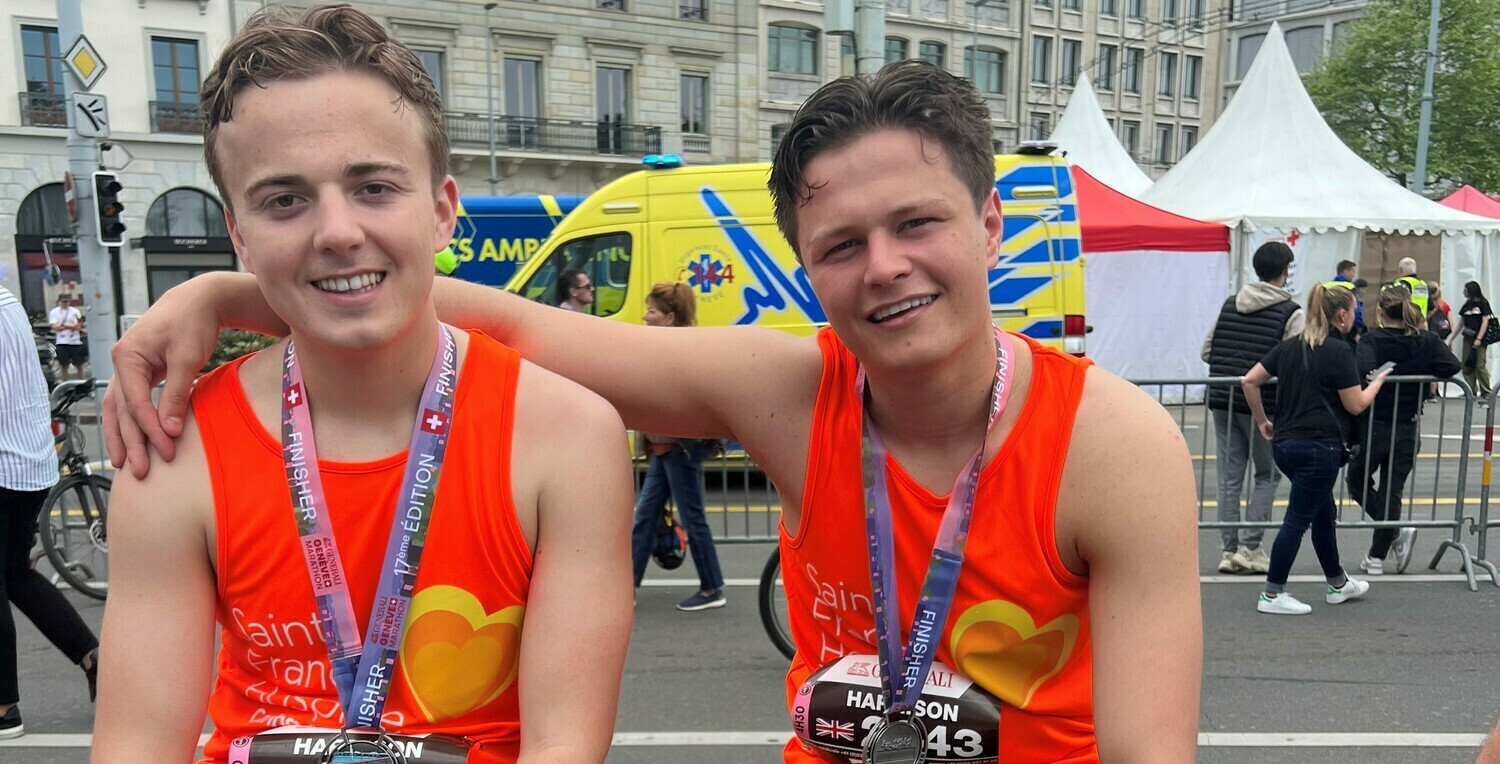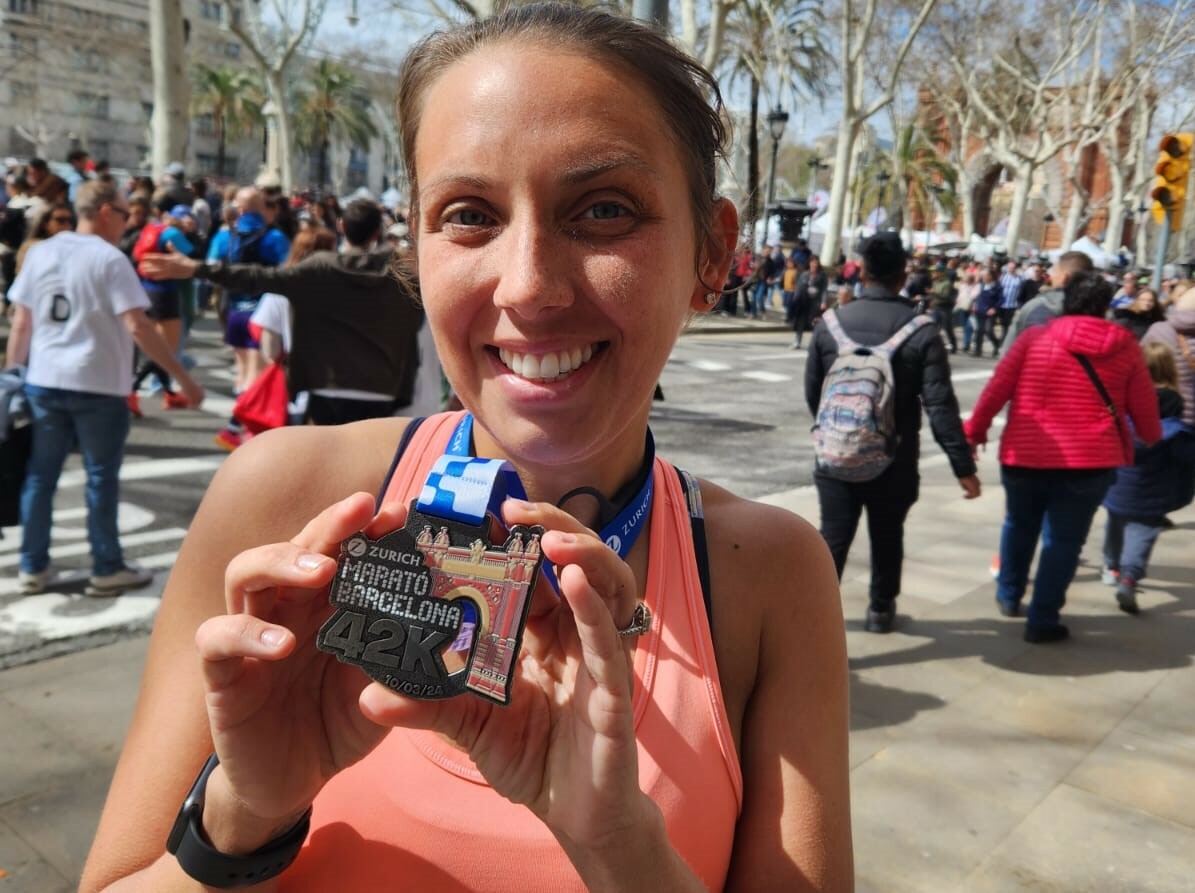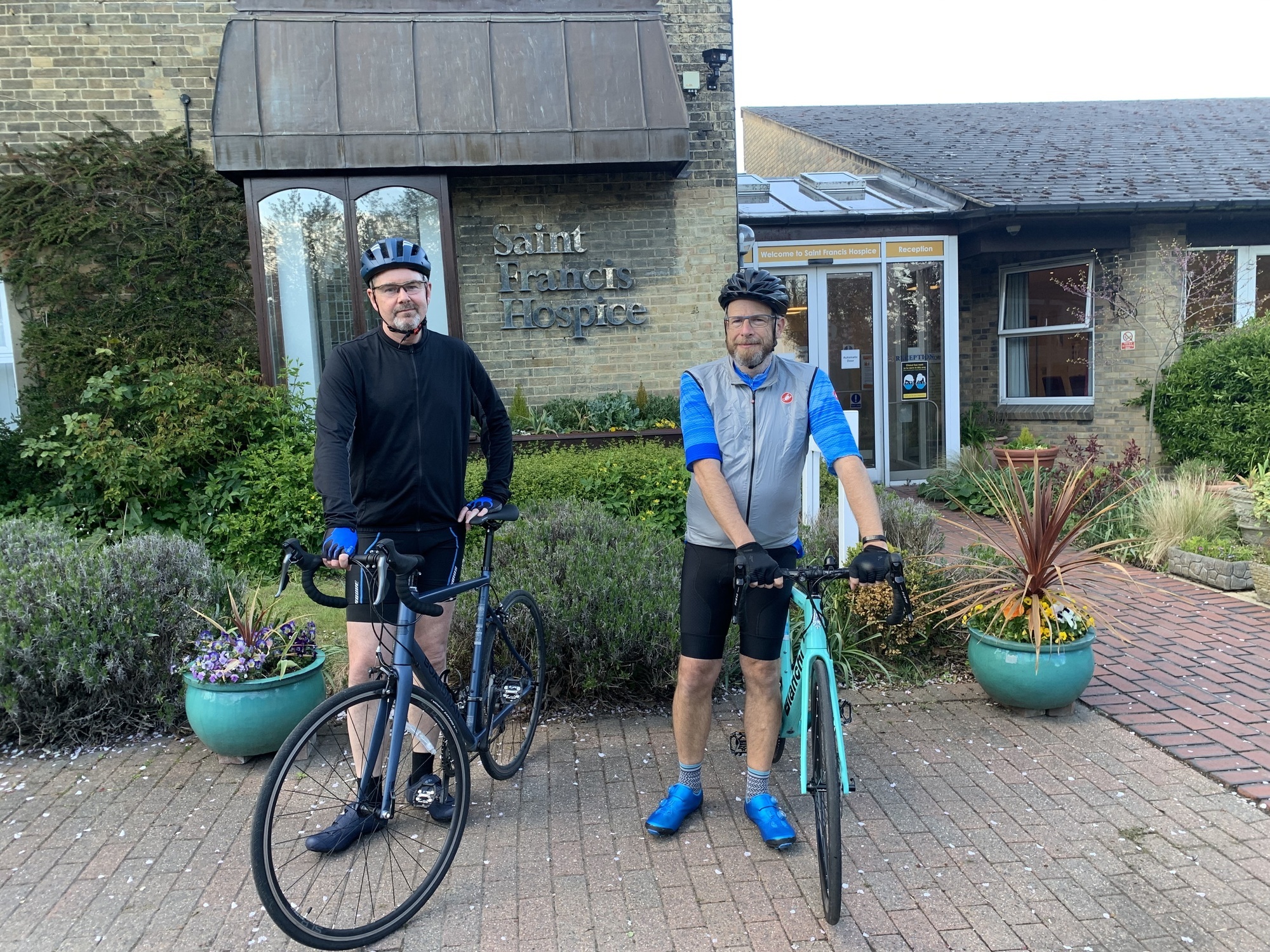Carers Week 2025 - Tara's Story
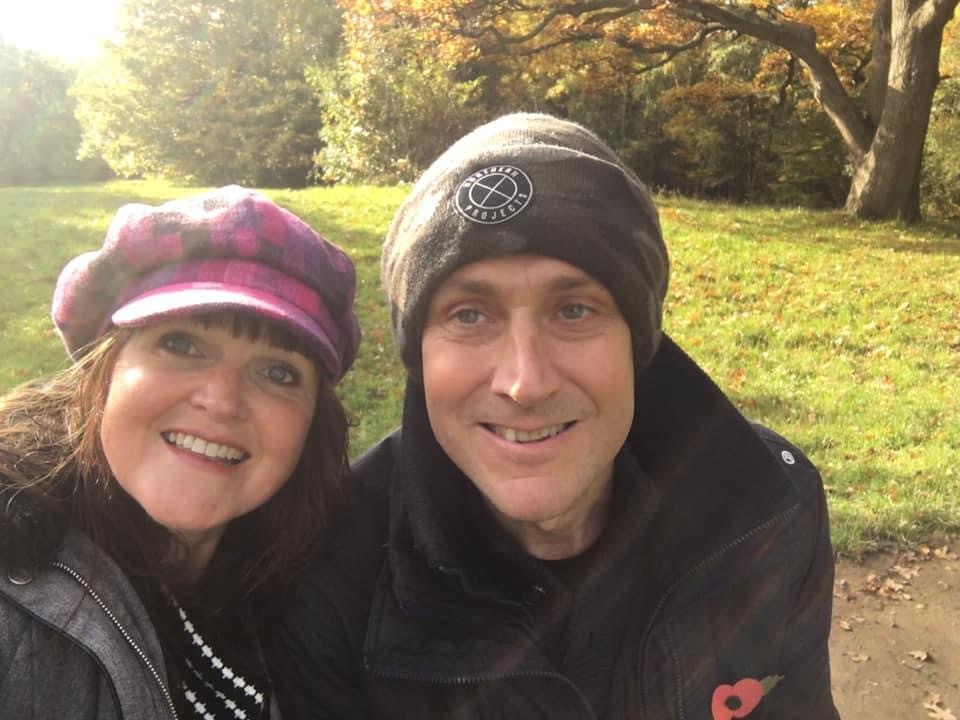
Andrew’s life changed dramatically when he was diagnosed with motor neurone disease age of 59. It also had a profound impact on his wife Tara and their life together.
As part of Carers Week 2025 (9th to 15th June), Tara shares the challenges she faces every day as a carer, and how despite everything the illness has taken away from the couple, their love for each other is stronger than ever.
Andrew and I had been together for 8 years when we got married in 2022. We moved house the year before, and we were looking forward to our next chapter.
Andrew was working as an engineer, and he was so independent and active. We knew something was wrong because we played tennis and he started having shortness of breath. He lost a stone in weight over a short period and because he is 6ft 2, it was really noticeable. Andrew was eventually diagnosed with motor neurone disease in December 2023.
It wasn’t till around August 2024 when Andrew's health started to deteriorate that my role as a carer came in.
Day to day life changed significantly
When you are living with someone day to day, you do not get a break, and it is exhausting. You do not switch off and there is no down time.
I am self-employed and I work as a psychotherapist, so I juggle work around caring for Andrew. He is at home a lot more because his breathing and planning for equipment makes it difficult to go out.
He stopped driving in March 2025 due to tiredness and an increase in relying on his NIV (non-invasive ventilator for breathing) so although I used to attend appointments with him, he can only go to places if I can take him.
Andrew can still use his hands, but he needs support with his showering, preparing his medication and his overnight feed as he is fed through a tube.
The disease has affected Andrew’s speech, and although he has a voice bank, he cannot speak on the phone, so all his calls come through me.
We used to do everything together and share the chores, Andrew was so good with that. All these things still have to get done which can be exhausting.
The machine he needs to help him breathe at night constantly beeps so even when we do sleep, we sleep lightly. And when Andrew doesn’t sleep, my nights are often disturbed.
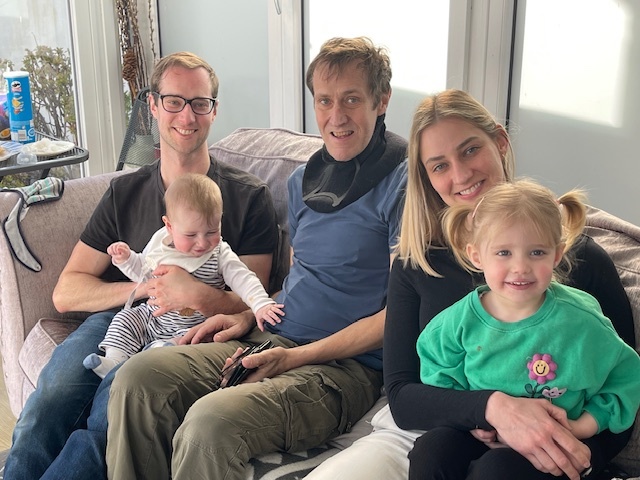
Andrew with his children and grandchildren
It means a lot when people ask how I am as a carer
People ask about the person going through it, which of course is understandable, but when people ask how I am, it means so much to me and sometimes it can make me cry.
I wish people could do it more as it makes me feel seen as a carer.
You are experiencing living grief
Watching the health of someone you love decline is so difficult. As a carer, it’s so important to have support around you.
People think that grief happens when someone has passed away. With an illness like motor neurone disease, you are grieving from the time you are diagnosed.
You are experiencing living grief. You feel it on such a deep level. With cancer there is hope as you may get a treatment that will enable you to survive but with motor neurone disease, the hope is marginal.
Saint Francis Hospice has been a God send.
Saint Francis Hospice has been a God send. I used to work in a hospice, so I knew how lovely and helpful hospices were.
At first, my husband was quite hesitant because he had that fear about hospices’ being a place to die, but I assured him that it was a place to live.
We found out about the Neuro Group, a support group for people with neurological illnesses, which meets once a month in Pemberton Place at the hospice. When a place became available, we came along, and we’ve never looked back.
It really helps Andrew to talk with other people who are going through similar health problems, and he’s made friends with other people in the group.
It’s helpful to meet other carers
By going along to the group sessions, I have met other carers. We have amazing support from Wendy and Briony who are social workers with the hospice’s Family and Individual Support team.
Wendy checks in to see how we are doing without our loved ones in the room. We can just be ourselves and relate to each other as carers and give each other support and understanding.
You do not realise how stressed you are until you talk about it. I come to see Briony every three weeks as the disease is progressing. The hospice is bright and airy, and it is a safe place to talk about how being a carer has impacted day-to-day living.
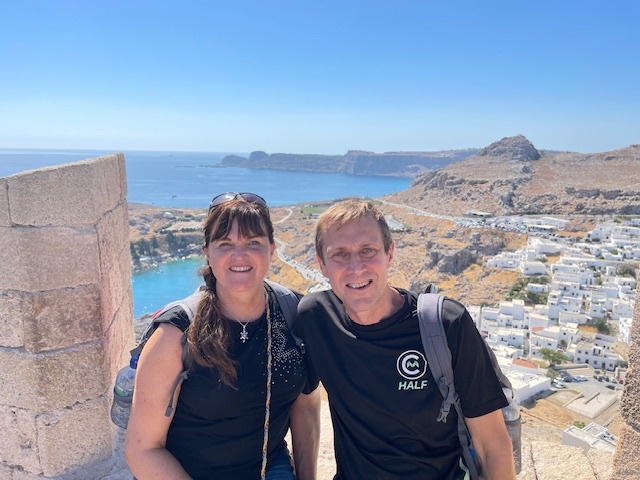
Tara and Andrew on their honeymoon in Rhodes 2022
Andrew has counselling support
My husband has never been a talker. He thought therapy would not do anything for him. When Wendy first came to visit him, he didn’t know what he would get from it, but he opened up to her and he now sees her regularly.
It reassures me that he is getting an outlet to talk, and it takes some pressure off me knowing he has a lot more support than just me.
Therapies Team
The hospice has shown us that it is not about taking things away, it is about helping people to be as independent as they can. We have seen that first hand so strongly.
The staff are professional, and they talk about what they can offer Andrew and what is available at the hospice.
When Andrew was able to drive, he attended the exercise group, the physiotherapy group and the breathlessness group.
It gave me a bit of respite because I knew he was in safe hands. Now, we mainly attend the Neuro Group because Andrew is no longer well enough to participate in the exercise groups. The hospice provided transport for Andrew, when my work commitments prevented me from driving him there.
Carers are also offered complementary therapies such as reflexology or reiki. I haven’t been able to take it up yet, but I am hoping I will find the time to do so.
The nursing support has been fantastic
The hospice has been so helpful with signposting us to different services that may help us.
The advice we have found there is invaluable, and the nursing support has been fantastic. They are so understanding and knowledgeable. They have been really good and have liaised with our GP and district nurse. We also have a regular nurse, Laura, from the hospice, who keeps in contact with us weekly. It is so reassuring to know that there is someone at the end of a line if something happens.
For us, the hospice has been the glue that has brought all the services together. We can relax with the hospice. I have so much faith in Saint Francis. They do what they say, and they are always checking in.
Nothing prepares you for being a carer
Being a psychotherapist gives me a lot of insight, but nothing prepares you for being a carer. My job requires me to be compassionate with others. As a carer, it is imperative to extend compassion to yourself. To be gentle and kind to yourself, especially on really tough days. Giving myself permission to have a rest, go for a walk, go for a drive or have a coffee with family or friends.
It gives me an even deeper understanding of carers who are living with someone who is seriously ill. There is always something to be gained from that.
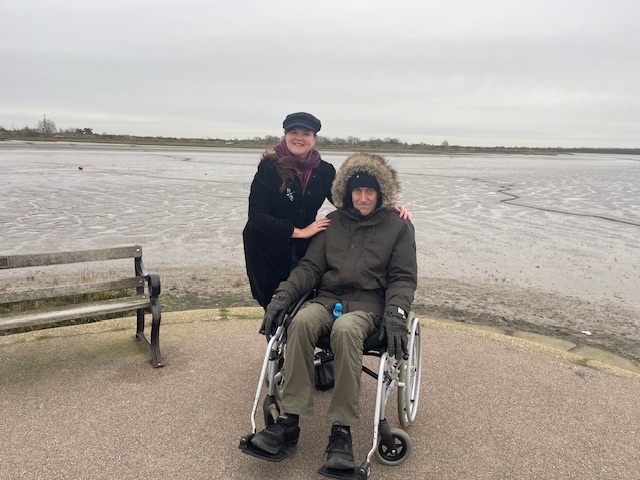
Tara and Andrew at Maldon.
Constant feelings of fear and guilt
As a carer, I live in fear. The fear of Andrew falling and the fear of coming home and wondering if he is still going to be around when I come in the door. Is he still going to be alive?
I feel guilty when I go out or if I have been gone too long. I feel guilty that I can still go out and do things that Andrew can’t do. I can still eat healthy food and play tennis. A lot of his choices are gone and that makes me feel very upset.
I have three sons. My younger son lives with us and I have to be mindful of how it affects him too.
I miss our time together
I miss our time together and all the things we used to do. I miss the closeness, that connection and that bonding we had. We do not go on holidays because Andrew cannot travel too far.
As a carer, you can feel a bit trapped as you cannot just go out, go for a walk or get a bit of fresh air like you used to, but I also realise that is how Andrew is feeling as well.
I can often feel life is out of control and become angry, resentful and upset. As a carer, I often gloss over or dismiss my feelings. That's something a lot of carers talk about. You feel you should be able to cope, this is your role. But I am human first, I am not perfect, and I cannot get it right all the time.
When I feel myself becoming really emotional, I take a step back and try to focus on the things I can control.
This cannot be happening to us
There is no time limit to this disease. You are continually living with the stress of the unknown. Life outside the home is going on, but for us personally, our lives have changed dramatically. It has taken a full year to process what has happened and to accept that it is real. My husband has felt it because he is going through it, and it is the same for me as well. I would think, this cannot be happening to us.
Aging is normally a gradual process and although my husband is still young, I have seen him age considerably in such a short space of time. With motor neurone disease, the changes are so dramatic. Just as you get used to one change, another change happens.
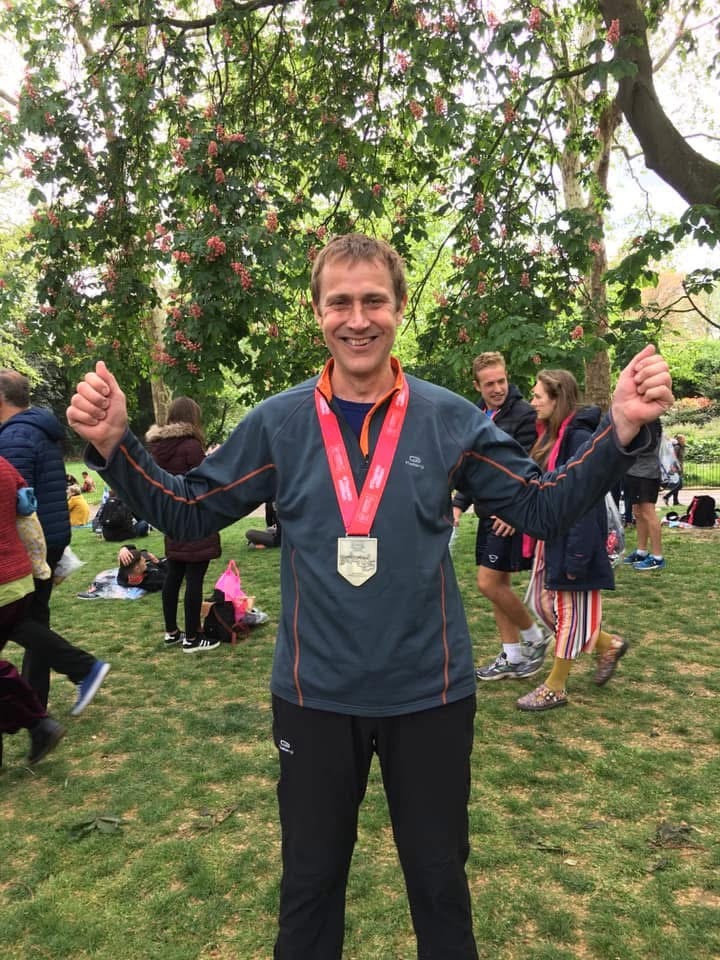
Andrew after running the London Marathon in 2019.
The importance of caring for your wellbeing as a carer
I have to make sure as a carer that I get support so I can cope. Support also comes from seeing my friends, seeing my family, eating healthily, and taking time for myself. I still play tennis when I can and get out in the garden when it is a nice sunny day. I find the garden very therapeutic and mindful.
Life is still about living with this disease
We can find the humour in connection with motor neurone disease, you have to! We have some real giggles when we come to the hospice. We really enjoyed the Christmas quiz and the raffles and most recently, we went on a day trip to Westcliff with other people from the Neuro Group.
Life is still about living with this disease. At home, we watch more comedy together on television. We play Scrabble and do things that Andrew can still do. It brings us happiness, and by distracting us for half an hour, it helps us to cope.
We have 5 adult children between us. Andrew really enjoys visits from the family, especially our 4 young grandchildren who are a ray of sunshine. They bring normality and I see how Andrew lights up when they come over to visit. It’s so lovely to see.
Hospices are invaluable
As a carer you are so aware that hospices are underfunded by the government. Hospices are invaluable. They are an absolute necessity, and everyone should have access to hospice care so they can die in a way that is dignified, supported, and loved.
Making Plans
It is a hard journey to watch, but we do get to plan and to tie up lots of loose ends. It is so important as so many people do not want to talk or have the chance to plan. We have shared our wishes. My husband is very practical, and I know his wishes, what he wants and what he does not want. It has made me get my will in order. By having these conversations and making plans, you know you are honouring that person’s wishes. That is such a gift to give someone and the family. It is the last thing we can do for someone - to celebrate their life and who they were as a person.
People just see the illness
Andrew is the most amazing family man who would do anything for his family. He was so fit and active. When he was young, Andrew ran cross country for his county, and he even ran the London Marathon in 2019. People often just see the illness, but people are so much more than that.
As a carer, I am mindful to allow Andrew to be as independent as he can. To take a step back and ask what is right for him. It has given me even more patience. You have to keep checking in with the person and you won’t always get it right.
It has surprised me the level of compassion and heart it brought out in me because of the vulnerability of the disease. I did not think my heart could be any bigger. Even though so much has been taken away from us, I love him even more. It is true. There is no question that he would do it for me in a heartbeat.
We have always been solid and had each other's backs. This is unconditional love, and it is the final test of our relationship and what we are willing to do for someone we love.



